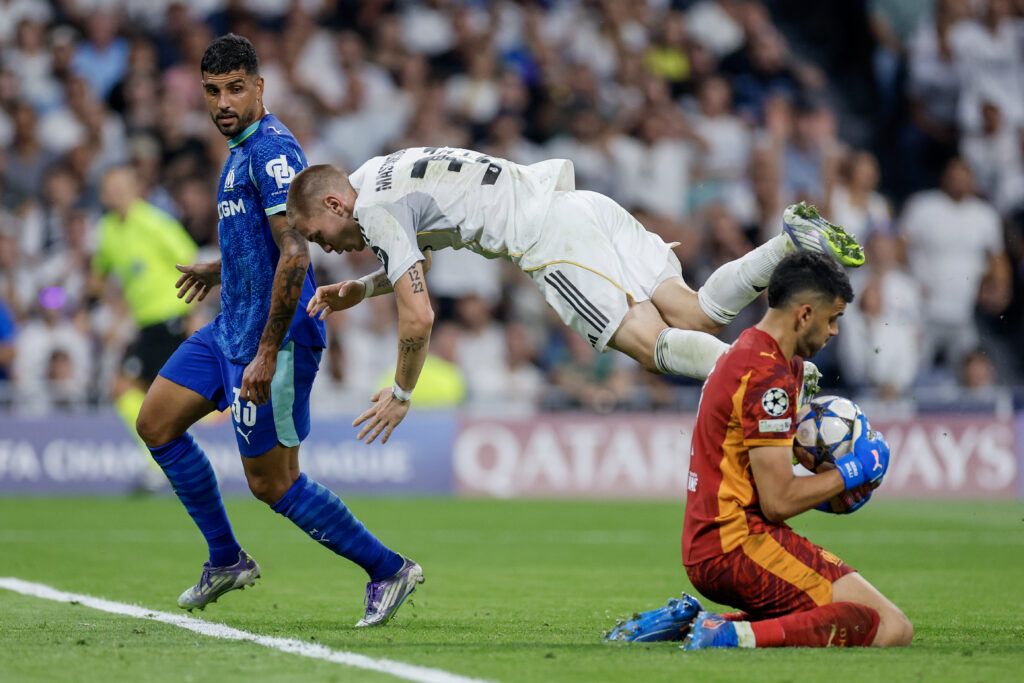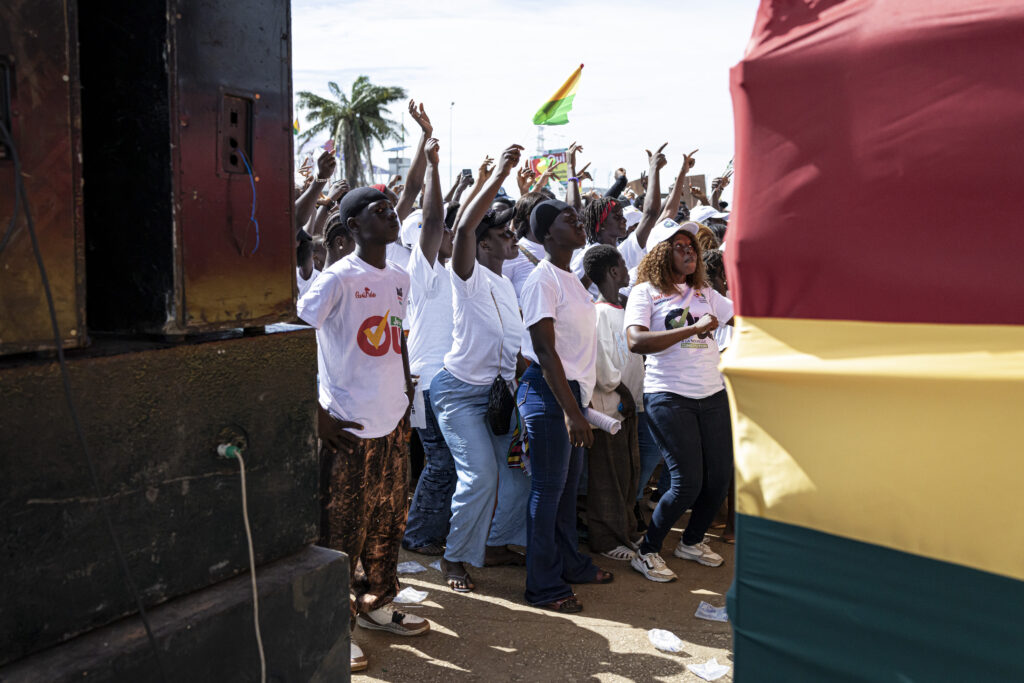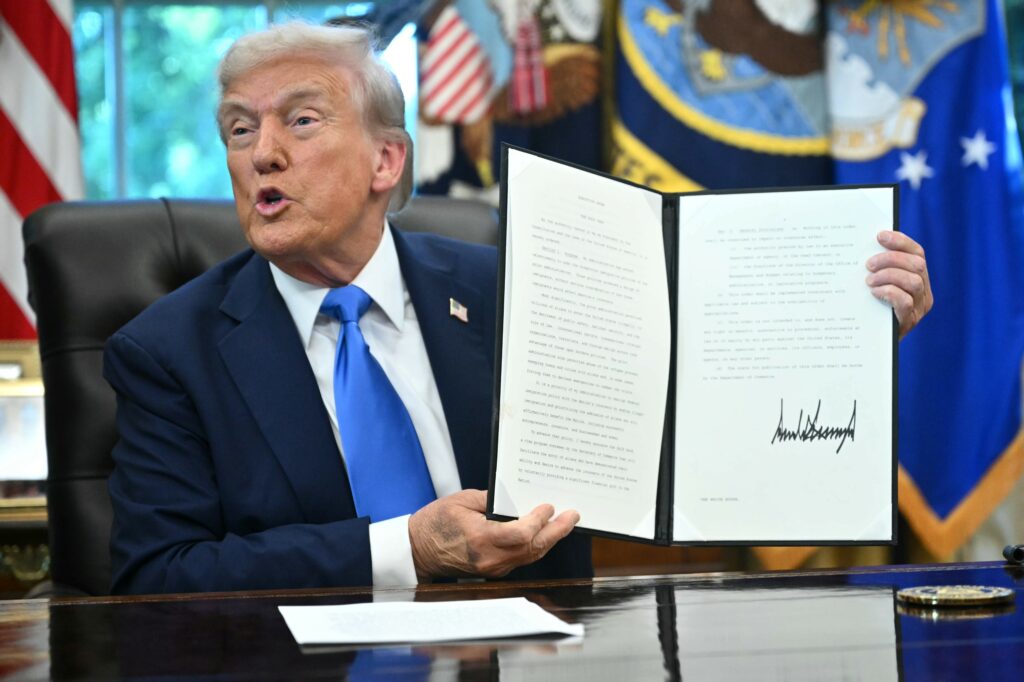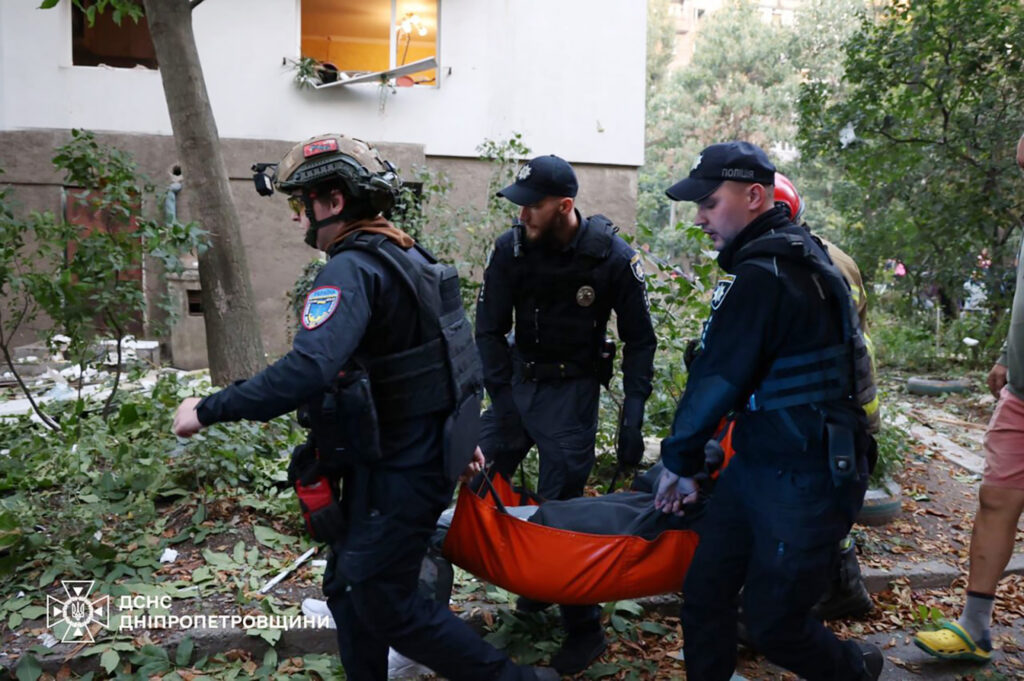Ligue 1: Geronimo Rulli, le mur marseillais
Epoustouflant mardi à Madrid, où Kylian Mbappé ne l’a fait céder que sur deux penaltys, le gardien marseillais Geronimo Rulli semble reparti sur les mêmes bases que lors de sa formidable première saison à l’OM, qui aura encore besoin de ses exploits dimanche face au Paris SG.Mardi soir en tribune de presse, après la défaite marseillaise face au Real Madrid (2-1), deux journalistes d’un quotidien sportif bien connu se sont affrontés quelques instants autour de la note à attribuer à Rulli: un excellent 9 ou un exceptionnel 10 ?La première option a prévalu, peut-être car il y a eu quelques scories mineures dans la copie de l’Argentin, un contrôle raté en position dangereuse, une ou deux relances égarées et le regret d’un deuxième penalty touché mais pas repoussé.Pour le reste, Rulli a tout sorti, parfois aidé par son poteau ou sa transversale, avec l’ahurissant total de 13 arrêts, dont 10 pour la seule première période, un record en Ligue des champions selon le statisticien Opta. Au passage, le gardien marseillais a aussi fait dégoupiller Dani Carvajal, expulsé pour lui avoir donné un léger coup de tête.Mais l’OM s’est incliné, malgré tout, et l’exigeant Rulli ne pouvait pas se satisfaire de son festival de parades à Santiago Bernabeu. “Je suis content de mon match, au plan personnel. Mais je suis déçu du résultat. On aurait pu vivre une très belle soirée, ou au moins prendre un point”, a-t-il regretté vendredi en conférence de presse.- Duel avec Chevalier -Vivre une très belle soirée ou prendre au moins un point, l’objectif marseillais sera le même dimanche contre le PSG, lors d’un match qui sera aussi un duel de gardiens de très haut niveau, entre Rulli et Lucas Chevalier.”On va sans doute affronter le meilleur PSG de l’histoire. Ils ont presque tout gagné la saison dernière. C’est notre rival et on aspire à les battre. Mais eux continuent à avancer”, a tout de même relativisé l’Argentin vendredi.L’OM avance aussi, à sa façon parfois chaotique, et la deuxième place obtenue la saison dernière en atteste. Et cette réussite doit beaucoup à Rulli, auteur d’une saison pleine et notamment de six premiers mois hors norme.Après trois saisons sans éclat de Pau Lopez, et alors que Steve Mandanda a annoncé sa retraite la semaine dernière, l’OM a donc retrouvé un gardien de premier plan, d’autant plus ambitieux qu’il vise une nouvelle Coupe du Monde avec l’Argentine en fin de saison.”Mon objectif personnel est de donner encore une meilleure version de ce que vous avez vu la saison dernière”, a-t-il ainsi expliqué vendredi.- “Garçon sensible” -Le début d’exercice n’a pourtant pas été simple pour Rulli, impliqué lors de la première journée à Rennes dans l’altercation qui a dégénéré en bagarre entre Jonathan Rowe et Adrien Rabiot, un cadre dont il était proche.”Quand tu perds deux équipiers, ce n’est pas agréable. Mais c’est passé, ils sont partis. D’autres sont arrivés, avec enthousiasme. Ca a été douloureux mais c’est derrière nous et on doit avancer”, a encore assuré l’Argentin.”Il est resté un peu déçu. C’est un garçon sensible et comme Leonardo Balerdi, il a souffert un peu plus que d’autres”, a tout de même reconnu Roberto De Zerbi.A l’origine de sa venue à l’OM, alors que Rulli sortait d’un passage difficile à l’Ajax Amsterdam et que la direction marseillaise avait initialement d’autres noms en tête, l’entraîneur italien de l’OM sait en tous cas qu’il n’y a pas eu d’erreur de casting au poste de gardien.”L’année dernière, son rendement a été très haut. Pour cette saison, je lui demande de faire des arrêts, de bien jouer avec les pieds et de réussir quelques miracles comme la saison dernière. Et je pense que ça suffit”, avait dit en souriant l’Italien à la fin du mois d’août.Les premiers miracles ont été réalisés à Madrid, les prochains sont espérés dimanche.
Ahead of Guinea referendum, proponents are vocal but opposition silencedSat, 20 Sep 2025 12:19:24 GMT
Some are confident in a new direction for their country while others fear continued restrictions on freedoms: In Guinea, where people will cast ballots Sunday on a new constitution, voters are divided.The draft constitution, if approved, is in theory meant to return the west African nation of 14.5 million to constitutional order following four years …
Trump impose des frais de 100.000 dollars par an pour un visa emblématique de la tech
La principale association professionnelle indienne a fait part samedi de sa “préocupation” concernant l’annonce par le président américain Donald Trump de frais annuels de 100.000 dollars pour des visas de travail très utilisés dans le secteur technologique, avec des conséquences potentiellement majeures pour ces entreprises recrutant beaucoup en Asie.Cette mesure entre en vigueur dimanche. Les visas H-1B permettent à des travailleurs étrangers aux qualifications précises (scientifiques, ingénieurs et programmateurs informatiques entre autres) de venir travailler aux Etats-Unis. Ces permis de travail sont à durée déterminée, d’une période initiale de trois ans, prolongeable à six ans, pour des étrangers parrainés par un employeur.Donald Trump affiche depuis son premier mandat sa volonté de les limiter afin de donner la priorité aux travailleurs américains. “L’idée générale, c’est que ces grandes entreprises de la tech ou d’autres secteurs ne formeront plus de travailleurs étrangers”, a expliqué le ministre du Commerce Howard Lutnick, aux côtés du président américain dans le Bureau ovale, en assurant que “toutes les grandes entreprises sont partantes”.Si elles recourent à des travailleurs étrangers, “elles doivent payer 100.000 dollars au gouvernement et, ensuite, payer leur employé, ce n’est pas rentable”, a-t-il poursuivi. “Si vous voulez former quelqu’un, vous allez former un jeune diplômé d’une des grandes universités de notre pays, former des Américains, et arrêter de faire venir des gens pour prendre nos emplois.”La Nasscom, a exprimé samedi sa “préoccupation”, craignant de possibles conséquences sur les “continuité” de certains projets.Elle s’est aussi inquiétée du court délai d’un jour, qui “crée une incertitude considérable pour les entreprises, les professionnels et les étudiants du monde entier”, a-t-elle déclaré dans un communiqué.Elle a ajouté que des changements de politique de cette ampleur devraient être introduits “avec des périodes de transition adéquates, permettant aux organisations et aux particuliers de pouvoir s’organiser efficacement et de minimiser les perturbations”.Le nombre de demandes de visas H-1B aux Etats-Unis a nettement progressé ces dernières années, avec un pic d’acceptations en 2022 sous la présidence du démocrate Joe Biden. A l’opposé, le pic de refus a été enregistré en 2018, pendant le premier passage de Donald Trump à la Maison Blanche.- Nombreux Indiens -Les Etats-Unis ont approuvé environ 400.000 visas H-1B en 2024, dont les deux tiers étaient des renouvellements.Les trois quarts des candidats approuvés au visa H-1B sont des ressortissants indiens.Les grandes entreprises technologiques emploient un grand nombre de salariés indiens qui se rendent aux Etats-Unis ou font des allers-retours entre les deux pays. Les entrepreneurs de la tech – y compris l’ancien allié de Trump, Elon Musk – ont mis en garde précédemment contre les ciblage des visas H-1B, affirmant que les Etats-Unis n’ont pas suffisamment de main d’oeuvre qualifiée sur place pour les besoins du secteur.Selon une copie du décret signé par Donald Trump, des frais seront exigés pour ceux qui cherchent à entrer dans le pays à partir de dimanche, la ministre à la Sécurité intérieure Kristi Noem pouvant exempter des individus, des entreprises ou des secteurs entiers.Cette annonce s’ajoute à un arsenal de mesures anti-immigration prises par le président américain et son gouvernement, qui procède par ailleurs à des expulsions massives d’immigrants en situation irrégulière.Donald Trump a également signé un décret créant une carte de séjour “dorée” à un million de dollars, en référence à la célèbre “carte verte” qui permet de vivre et travailler aux Etats-Unis.”Cela va être un immense succès”, a-t-il prédit à propos de ce nouveau système, qui doit permettre à des citoyens étrangers aux “qualités exceptionnelles” de se procurer une “carte dorée”.”Contre le paiement d’un million de dollars au Trésor américain, ou, si une entreprise les parraine, deux millions de dollars”, les candidats à cette “carte dorée” “bénéficieront d’un traitement accéléré de la procédure de visa”, a précisé un conseiller de Donald Trump.
S. Africa opposition launches campaign to seize Johannesburg from ANCSat, 20 Sep 2025 11:53:51 GMT
South Africa’s Democratic Alliance, the opposition party in a fragile coalition with the African National Congress, on Saturday named veteran activist Helen Zille to lead its campaign to take country’s main city Johannesburg from the ANC in elections next year.Local elections scheduled to be held between November 2026 and January 2027 loom as a major …
Zelensky says will meet Trump next week as Russia intensifies attacks
Ukrainian President Volodymyr Zelensky said he would meet US counterpart Donald Trump on the sidelines of the United Nations General Assembly next week as Russia intensified strikes across his country.Russia carried out one of its largest aerial attacks overnight, firing 40 missiles and some 580 drones at Ukraine in a barrage that killed at least three people and wounded dozens, Zelensky said Saturday.A Ukrainian strike, meanwhile, killed four people in Russia’s southwestern Samara region, local governor said, in one of the deadliest Ukrainian retaliatory strikes on Russia since Moscow launched its invasion in 2022.Zelensky said he would hold “a meeting with the President of the United States”, adding he would discuss security guarantees for Ukraine and sanctions on Russia during the talks with Trump.Ukraine has insisted on Western-backed security guarantees to prevent future Russian attacks. Russian President Vladimir Putin has however warned that any Western troops in Ukraine would be unacceptable and legitimate targets.A US-led push for a quick end to the war has stalled and Russia effectively ruled out a meeting between Putin and Zelensky — something that Kyiv says is the only way towards peace.”We expect sanctions if there is no meeting between the leaders or, for example, no ceasefire,” Zelensky said in comments released by the Ukrainian presidency on Saturday.”We are ready for a meeting with Putin. I have spoken about this. Both bilateral and trilateral. He is not ready,” Zelensky added.In Russia’s latest aerial assault of Ukraine, “a missile with cluster munitions directly struck an apartment building” in the central city of Dnipro, Zelensky said earlier on social media.He posted pictures of cars and a building on fire and rescuers carrying a person to safety amid rubble scattered nearby.In the Dnipropetrovsk region, the strikes killed one person and wounded at least 30, with one man in a serious condition, regional governor Sergiy Lysak said.- ‘Intense’ fighting -The strikes come a day after three Russian fighter jets violated the airspace of Estonia — a NATO member on the alliance’s eastern flank — an allegation Moscow denied.But it triggered fears in the West of a dangerous new provocation from Moscow after Poland last week complained that around 20 Russian drones overflew its territory.Zelensky repeated the call for “joint solutions” to shoot down drones over Ukraine “together with other countries”.Russia, which has been chipping away at Ukrainian territory for months, announced on Saturday its troops had captured the village of Berezove in the Dnipropetrovsk region.In the northeastern Kharkiv region, “intense actions” were ongoing in the key area of Kupiansk, Zelensky said, referring to a rail hub Ukraine recaptured in its 2022 offensive.In Russia, four people were killed “in an enemy drone attack last night,” Samara governor Vyacheslav Fedorishchev said on social media.He earlier said “fuel and energy facilities” were targeted, without specifying the damage.Ukrainian General Staff said “strategic objects of the Russian aggressor were struck”, adding its forces “inflicted damage” on the Saratov Oil Refinery and struck the Novokuybyshevsk Oil Refinery in the Samara region.”Preliminary information indicates that explosions and fires were recorded at the site as a result of the strike,” it said on social media.The Russian defence ministry said on Saturday its air defence alert systems “intercepted and destroyed” 149 Ukrainian drones overnight, including 27 over the Saratov region and 15 over the Samara region.Three rounds of direct peace talks between Russia and Ukraine in Istanbul have failed to yield anything more than large-scale prisoner exchanges.Russia has maintained a series of hardline demands, including that Ukraine fully cedes the eastern Donbas region — parts of which it still controls.Kyiv has rejected territorial concessions and wants European troops to be deployed to Ukraine as a peacekeeping force, something Moscow sees as unacceptable.





